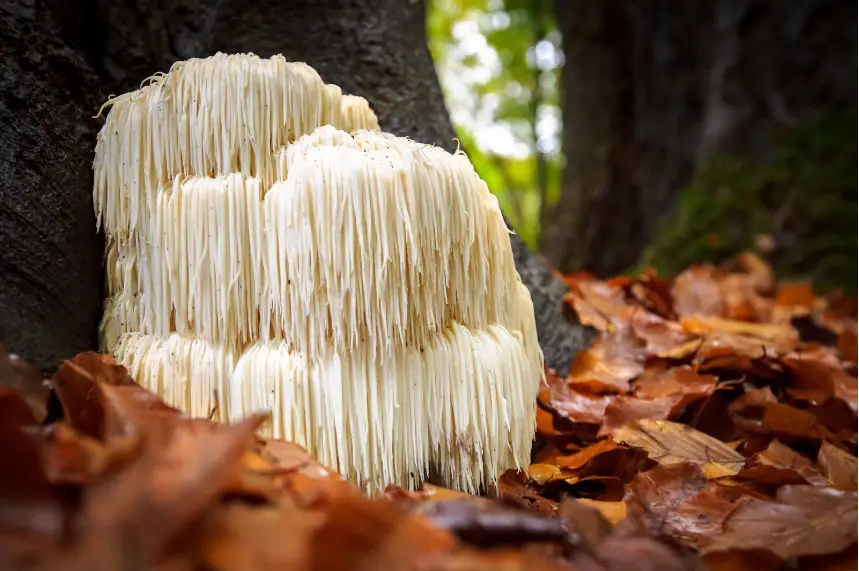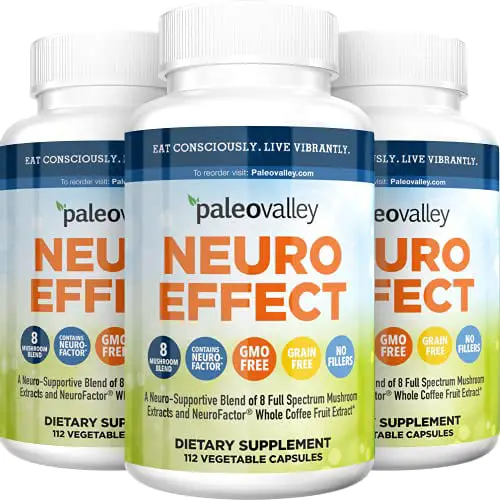
Image by Fotografiecor.nl on Shutterstock
Guest Post By Ellie Shipley
Hericium erinaceus (HE) caps the chart for most creatively named mushroom. In Japan it’s known as Yamabushitake, after the costume of Buddhist monks. In China it’s known as houtou, meaning “monkey head,” and other nicknames include white pom pom, bearded tooth fungus, and hedgehog mushroom.
But you’ve probably heard it called lion’s mane, as that’s what the spiny threads on top of this fungus resemble most. And while it’s not psychoactive, it does seem to own magical properties. So let’s take a look at some of the health claims that surround lion’s mane.
A Better Brain
Lion’s mane is a nootropic mushroom that has been ascribed attributes that improve brain health. Its popularity due to social media marketing and ongoing scientific research have led more and more people to believe that, like a lion, this fungus gives you nerves of steel.
Let’s look at the science behind these claims. Lion’s mane contains compounds like erinacines and hericenones that cross the blood-brain barrier and stimulate the synthesis of nerve growth factor (NGF) and brain-derived neurotrophic factor (BDNF).
Recent lab results have brought some great news for patients with impaired cognitive ability as well as for neuroscience.
One study on chicken embryos revealed that lion’s mane extract stimulated more neurite outgrowth than NGF, proving its neuroregenerative capability. This gives it medicinal potential for treating Alzheimer’s and Parkinson’s diseases, as it has been shown to prevent nerve damage caused by amyloid-beta plaques that accumulate in the brain.
In one of the few studies done on human subjects, lion’s mane powder improved cognitive functioning in Japanese adults aged 50 to 80 with mild cognitive impairment. Unfortunately, the boost faded shortly after ceasing supplementation.
Improve Heart Health
When LDL-cholesterol oxidizes, catalyzed by free radicals, it hardens and is prone to attach to artery walls. The good news is that mushrooms, including lion’s mane, can help prevent stroke and heart attacks because of their high antioxidant content.
Lion’s mane also helps lower triglyceride levels and prevent weight gain. One study suggests the mushroom does this by activating mRNA for a number of regulating genes.
Alleviate Stomach Ulcers

Image by Manutsawee Buapet on Shutterstock
Helicobacter pylori are vicious bacteria that most people get infected with during childhood. They eat away at the stomach wall and cause ulcers when not contained by sufficient antioxidant enzymes.
Fortunately, there’s evidence that lion’s mane can protect the stomach lining by stopping bacterial growth.
Fight Cancer
There are strong laboratory results indicating that the bioactive compounds in lion’s mane help destroy tumor cells. It has been demonstrated with various types of cancer, including:
- Leukemia
- Liver
- Colon
- Stomach
- Blood
The mushroom extract even showed a higher efficacy than traditional medication for slowing cancer growth. In another study, it reduced migration of cancer cells by a staggering 66%.
Side Effects
Studies report lion’s mane has no toxicological effects, even at high doses. However, if you are allergic to mushrooms, you should naturally abstain from lion’s mane. Asthma symptoms may also worsen.
Due to lack of research, pregnant women are advised not to take lion’s mane. And always make sure to consult your physician before using it to treat a medical condition. Human research is still lacking for evidence to be permanently conclusive.
The Fantastic Fungus
Lion’s mane has been cultivated in Asia for centuries, and is native to North America and Europe as well. It’s best to cook it until crispy to obtain the crab-like flavor and meaty texture that can be expected from the shroom’s culinary use.
The fungus typically is ingested in small portions in the following forms:
- Raw
- Cooked
- Capsule
- Tablet
- Steeped in tea or coffee
Out of all mushroom species, the list of benefits is especially long for lion’s mane. The current body of scientific research describes it as:
- Neuroprotective
- Neuroregenerative
- Antioxidant
- Immunomodulatory
- Cytotoxic
- Antidiabetic
- Antibiotic
- Anticarcinogenic
- Antihypertensive
- Antihyperglycemic
- Antihyperlipidemic
- Anti-aging
- Cardioprotective
- Hepatoprotective
- Nephroprotective
People in Japan, who have the second-highest life expectancy on the planet, have been consuming lion’s mane for generations. So it might not be a bad idea to take out that gardening kit and start a regenerative farming business to provide the world more of this neuroregenerative and delicious mushroom.
Try an organic lion’s mane supplement with discounted value pack options
Thanks for installing the Bottom of every post plugin by Corey Salzano. Contact me if you need custom WordPress plugins or website design.





